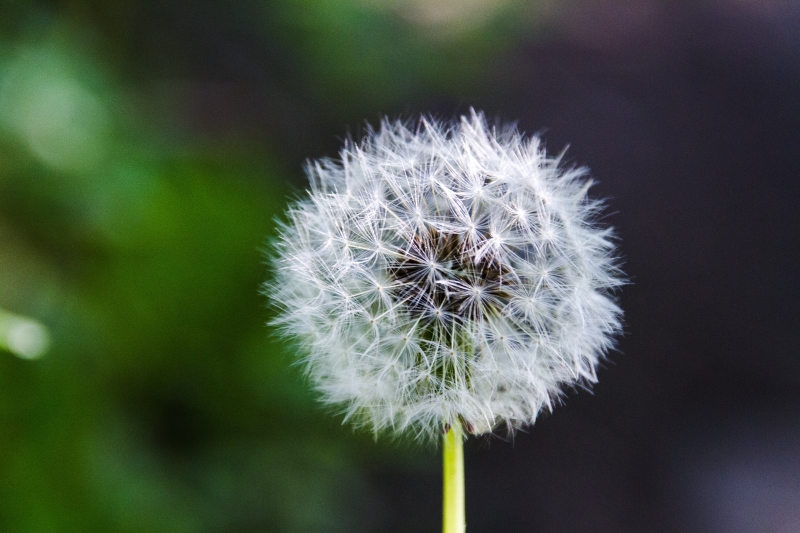The Beauty of the Dandelion
/Sometimes I feel useless.
I once felt accomplished, serving others rather than needing to be served. I brought meals to people in need but now I can’t even make my own coffee, and sometimes my husband even helps me lift my cup. When Joel is out of town, someone needs to stay with me because I can no longer stay alone. Nothing seems easy anymore, and I look back on my days of independence with longing. At times, I feel I have little to offer.
I know in my head that usefulness isn’t what the Christian life is all about. God doesn’t need me, and I am not indispensable in the kingdom- none of us are. God delights in us, not because of anything we bring or do, but simply because we are his beloved children.
Additionally, usefulness isn’t for us to measure; God often uses us in ways that we never see or know. This life is not about our glory - the impact we make on this world - but about God’s glory. His grace is sufficient for us and his power is made perfect in our weakness. So when we look weak, we really are strong (2 Cor 12:9, 10b).
The dying dandelion, which is embedded in my logo and on my website, reminds me of strength from seeming weakness. While dandelions are unwelcome on my lawn, their beauty at the end of their lives has captivated me.
In its heyday, the dandelion is bright and rugged. It grows in harsh conditions, often in places where no one sees or knows but God. Some people see it as unstoppable, its bright yellow petals visible from a distance.
But as it is dying, being stripped of its strength, the dandelion is often hard to see. It has given everything and there seems to be nothing left; the vibrant color that once defined it is gone. In this stage, it is preparing to reproduce, doing its most glorious work.
Sometimes, like the dandelion, we feel we are most useful to God when we are sunny, strong and resilient. People notice us. But when our health changes and we feel delicate and dependent, we wonder what good our lives are. And society reinforces that doubt by ignoring the elderly, encouraging euthanasia, shunning the disabled, aborting the unwanted. It seems as though we must prove our usefulness for society to value us. And when we can’t, we may feel like a burden to others, wishing we could be more productive.
But when does the dandelion do its most important work? When it’s dying. When the fragile seeds are blown away by the wind. When it’s surrendered itself and is sowing seeds of new life. And the stronger the wind blows, the farther the seeds will go - to places that the lone flower could have never gone itself.
Lilias Trotter, an artist and missionary to Algeria in the late 1800’s said this:
This dandelion has long ago surrendered its golden petals and has reached its crowning stage of dying – the delicate seed globe must break up now – it gives and gives till it has nothing left… There is no sense of wrenching: it stands ready, holding up its little life, not knowing when or where or how the wind that blows with where it listeth may carry it away. It holds itself no longer for its own keeping, only as something to be given: a breath does the rest, turning the “readiness to will” into the “performance.”
In John 12:24, Jesus says, “Truly, truly, I say to you, unless a grain of wheat falls into the earth and dies, it remains alone; but if it dies, it bears much fruit.” A grain of wheat may be useful and majestic when it stands tall and alone, but it doesn’t reproduce or bear fruit then. Its influence is only multiplied when it falls into the ground and dies. When it’s bruised and buried and the external kernel rots away underground, carrying the seeds of new life.
When we die, whether it be physical death or the death of our dreams or dying to ourselves, something remarkable happens. God brings new life.
No one looks forward to dying. Or being stripped bare. Or feeling useless. Most people say they want to die in their sleep when they are capable and healthy; they don’t want to face the ravages of aging and disability. But watching others trust God as they struggle with debilitating frailties is sacred. It inspires me in my own struggles. I know that God will be sufficient for me just as he has been sufficient for them. Their stalk may be bare, but it stands firm. And those people are a marvel to me.
I have the privilege of being in a Pain Pal group with friends who are enduring unspeakable physical suffering. Many of them have caregivers because they cannot care for themselves. Yet their radiance is profound; they speak of an intimacy and joy in Christ that carries them through the worst pain imaginable. They are my heroes. Their willingness to praise God and encourage others amid their own struggles has changed me. Struggles like stabbing, mind-numbing relentless pain, waking up constantly through the night in agony (if they sleep at all), quadriplegia, multiple amputations, lying in bed in a dark room all day unable to do anything. Compared to most of them, I know nothing of suffering. And yet they constantly reassure me that my pain matters – all our pain matters.
These friends remind me of the dandelion. They are completely yielded to God and their lives are a testimony of his grace. They may feel they can do nothing but lie in bed and pray, but they are bearing more fruit than most do in a lifetime of serving. Their influence is greater than they can imagine, and the wind is carrying their witness to faraway places. It’s being carried by God who is using it for his glory.
Lilias Trotter has a sketch of the dandelion with a quote by Ugo Bassi beside it. It reads:
Measure thy life by loss and not by gain; not by the wine drunk but by the wine poured forth, for love’s strength standeth in love’s sacrifice, and he that suffereth most hath most to give.



